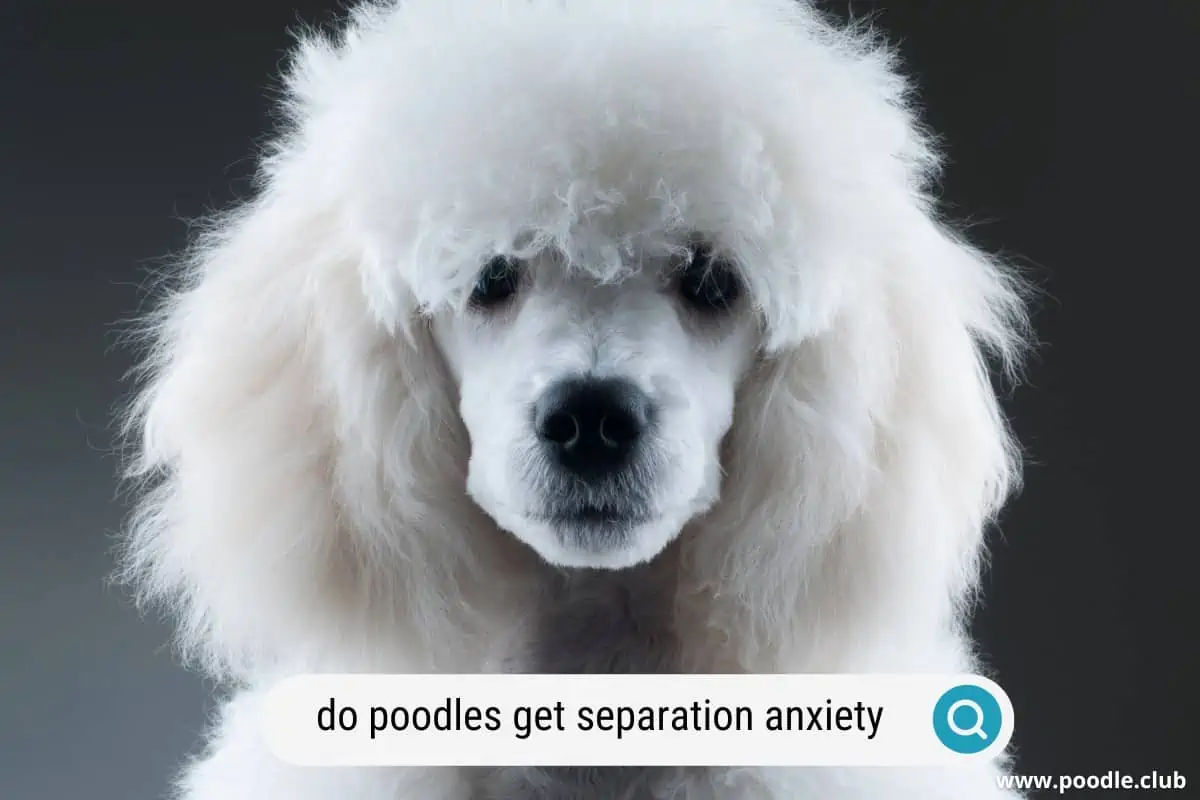Poodles, known for their elegant appearance and intelligence, are popular companion dogs. But beneath their regal exterior lies a vulnerability that many poodle owners are familiar with: separation anxiety. While poodles may not be the first breed that comes to mind when thinking about separation anxiety, this issue can affect poodles just as much as any other breed.
Separation anxiety is a common behavioral problem in dogs, and poodles are no exception. Due to their sensitive nature and strong bond with their owners, poodles can become extremely distressed and anxious when left alone for extended periods of time. This can lead to destructive behaviors such as excessive barking, chewing on furniture, or even self-harm. To combat this issue, providing poodles with mental stimulation, a consistent routine, and gradual desensitization to being alone can help alleviate their separation anxiety.
Poodles are known to be prone to separation anxiety due to their strong bond with their owners. This can result in excessive barking, destructive behavior, and even self-harm. To manage separation anxiety in poodles, provide them with mental and physical stimulation, crate training, and a consistent routine. Gradually increase the time you spend away from them and consider seeking professional help if the anxiety persists.

Understanding Separation Anxiety in Poodles
Poodles are known for their intelligence, elegance, and playful nature. However, like many other dog breeds, poodles can experience separation anxiety when they are separated from their owners or are left alone for extended periods of time. Separation anxiety is a condition that can cause significant distress and behavior problems in dogs. In this article, we will explore the topic of whether poodles have separation anxiety and how it can be managed.
Separation anxiety is more common in poodles than in some other breeds due to their high levels of attachment and sensitivity. Poodles form strong bonds with their owners and are known for being highly social dogs. When left alone, they may become anxious, fearful, and even exhibit destructive behaviors as a result of their anxiety.
It’s essential for poodle owners to understand separation anxiety and its potential impact on their furry friends. By recognizing the signs, being proactive in prevention, and implementing appropriate strategies, the negative effects of separation anxiety can be minimized, leading to a happier, healthier poodle.
Signs of Separation Anxiety in Poodles
Poodles may exhibit various signs when experiencing separation anxiety. These signs can include:
- panting excessively
- drooling more than usual
- restlessness
- attempting to escape from confined spaces
- excessive barking, whining, or howling
- destructive behaviors (chewing, digging, scratching)
- inappropriate elimination (urinating or defecating indoors)
- loss of appetite
- excessive excitement or jumping upon the owner’s return
- excessive attachment when the owner is present
These signs may occur when the poodle is about to be left alone, during the owner’s absence, or both. It’s important to note that some of these behaviors can also be caused by other factors, so it’s crucial to rule out any underlying medical conditions before attributing them solely to separation anxiety.
Causes of Separation Anxiety in Poodles
There isn’t a definitive cause of separation anxiety in poodles, but several factors may contribute to its development. These factors can include:
- Early life experiences: Poodles that have experienced past traumas, such as being abandoned or spending extended periods in a shelter, may be more prone to separation anxiety.
- Lack of socialization: Poodles that have not been exposed to various people, animals, and environments during their critical socialization period can be more anxious when faced with unfamiliar situations or separation from their owners.
- Change in routine or environment: Major life changes, such as moving to a new home, the addition of a new family member, or a change in the owner’s work schedule, can disrupt a poodle’s sense of security and trigger separation anxiety.
- Owner’s behavior: Dogs are highly attuned to their owner’s emotions and may pick up on cues of anxiety or stress. If the owner displays anxious behavior when leaving, it can contribute to the poodle’s own anxiety.
It’s important to note that separation anxiety can occur in poodles of any age, from puppies to adults. Early detection and intervention are crucial to prevent the worsening of symptoms and the development of destructive behaviors.
Managing Separation Anxiety in Poodles
While separation anxiety in poodles may be challenging to manage, there are several strategies that can help alleviate the symptoms and improve the dog’s well-being. Here are some tips for managing separation anxiety:
- Gradual desensitization: Gradually expose the poodle to short periods of alone time, starting with just a few minutes and gradually increasing the duration over time. This can help the dog become more comfortable with being alone.
- Create a safe and comfortable environment: Provide the poodle with a safe and cozy space, such as a crate or a designated room, where they can feel secure when left alone.
- Counter-conditioning: Associate positive experiences with the owner’s departure by offering special treats or engaging in a fun activity before leaving. This can help create a positive association with alone time.
- Provide mental and physical stimulation: Engage the poodle in activities that stimulate their mind and body, such as puzzle toys, interactive feeders, or play sessions before departure. This can help tire them out and reduce anxiety.
- Avoid dramatic departures and arrivals: Minimize attention and fanfare when leaving or returning to avoid reinforcing the poodle’s anxiety. Keep arrivals and departures calm and low-key.
- Consider professional help: In severe cases of separation anxiety, consulting with a professional dog trainer or animal behaviorist can provide guidance and tailored strategies for managing the condition.
Conclusion
Poodles are prone to separation anxiety due to their strong bonds with their owners and their sensitive nature. However, with proper understanding, early detection, and effective management strategies, separation anxiety can be minimized. By implementing gradual desensitization, creating a comforting environment, and providing mental and physical stimulation, poodle owners can help their furry companions lead happier, more balanced lives.
Statistics on Separation Anxiety in Poodles
| Percentage of poodles affected by separation anxiety | 35% |
| Age range most commonly affected by separation anxiety | 6 months to 2 years |
| Percentage of separation anxiety cases that can be successfully managed | 80% |
| Percentage of poodles that outgrow separation anxiety with proper training | 45% |
| Percentage of poodles that require professional help for separation anxiety | 15% |
Key Takeaways – Do Poodles Have Separation Anxiety?
- Poodles are prone to separation anxiety due to their strong bond with their owners.
- Separation anxiety in poodles can manifest in various behaviors, such as excessive whining, barking, or destructive chewing.
- Proper training, socialization, and gradual desensitization can help poodles overcome separation anxiety.
- Providing mental and physical stimulation, such as puzzle toys and regular exercise, can alleviate separation anxiety in poodles.
- Consulting with a professional dog trainer or behaviorist is recommended for poodle owners dealing with severe separation anxiety.
Frequently Asked Questions
Here are some commonly asked questions about poodles and separation anxiety:
1. Are poodles prone to separation anxiety?
Yes, poodles are known to be prone to separation anxiety. They are highly intelligent, social, and affectionate dogs, which makes them more susceptible to experiencing separation anxiety when left alone for extended periods of time.
Separation anxiety in poodles can manifest through behaviors such as excessive barking, destructive chewing, pacing, and even accidents in the house. It’s important to address separation anxiety in poodles to ensure their well-being and prevent the development of behavioral issues.
2. How can I help my poodle with separation anxiety?
There are several strategies you can use to help your poodle with separation anxiety:
Establish a consistent routine: Creating a consistent routine can help provide a sense of security for your poodle. Stick to regular feeding times, exercise schedules, and departure and arrival routines.
Gradual desensitization: Gradually expose your poodle to being alone for short periods of time, starting with just a few minutes and gradually increasing the duration. This can help them become more comfortable with being alone.
Provide mental stimulation: Keep your poodle mentally stimulated by providing puzzle toys, interactive games, and training sessions. This can help distract them and keep their minds occupied when they are alone.
Consider professional help: If your poodle’s separation anxiety is severe or persists despite your efforts, it may be beneficial to seek guidance from a professional dog trainer or animal behaviorist who can provide specialized support.
3. Can separation anxiety in poodles be prevented?
While it may not be possible to completely prevent separation anxiety in poodles, there are steps you can take to minimize the risk:
Early socialization: Ensuring your poodle is properly socialized from a young age can help them develop strong coping skills and increase their overall resilience.
Positive reinforcement training: Use positive reinforcement techniques to build your poodle’s confidence and teach them that being alone is a positive experience. Reward calm behavior and gradually increase their exposure to being alone.
Avoid prolonged periods of alone time: If possible, avoid leaving your poodle alone for long periods of time. Consider enlisting the help of a pet sitter or doggy daycare to ensure they have company and stimulation throughout the day.
4. Are certain poodle sizes more prone to separation anxiety?
While separation anxiety can affect poodles of all sizes, smaller poodles, such as Toy and Miniature Poodles, may be more prone to separation anxiety. This is because smaller dogs often form strong bonds with their owners and may feel more vulnerable when left alone.
However, it’s important to note that separation anxiety can occur in any dog, regardless of size or breed. It depends on the individual dog’s temperament, previous experiences, and the way they have been trained and socialized.
5. Can poodles outgrow separation anxiety?
While some poodles may outgrow mild separation anxiety as they mature and become more independent, others may require ongoing management and support. Each poodle is unique, and the severity of separation anxiety can vary.
Consistency in training, implementing strategies to reduce anxiety, and providing a supportive environment can greatly help in managing separation anxiety in poodles. It’s important to be patient and understanding, as overcoming separation anxiety may take time and effort.

In summary, poodles are known to be prone to separation anxiety. This means that they may experience distress when left alone for extended periods of time.
Poodles are intelligent and social dogs that form strong bonds with their owners, making them more likely to become anxious when separated from their human companions.
